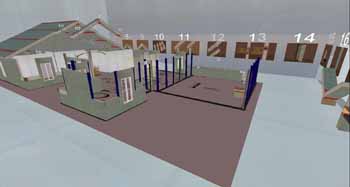Information Technology
Building Inspector Training Presentation. Presented to the Office of Weatherization Assistance and the Building Technologies Program at the Department of Energy, this presentation includes detailed photos of our building inspector training simulator, our learning management system, and information on the cost effectiveness of virtual world (VW) training.
Improving the Building Industry Through Learning Technologies. Article on how the latest learning technologies and virtual world sofrtware can be applied to regarding improve training in the building industry.
Energy Training for Building Inspection
Project Goal: FAS will build an interactive online program for training and certifying local building and home inspectors to evaluate code compliance for energy efficiency (including residential energy audits to evaluate existing homes for meeting energy efficiency incentive programs), seismic safety (compliance to seismic codes), and advanced building technologies (how to properly inspect advanced assembelies for correct installation, performance, and service). The result of meeting this goal is to properly train inspectors and rapidly increase the pool of inspectors so that home owners have assurance their properties meet code, have a benchmark performance, and receive recommendations to improve upon the building’s performance.
Overview: New standards for energy efficiency and seismic design, new incentives tied to energy audits, and innovative new building technologies are increasing the demand for well trained inspectors. The impact of these improvements and success of these technologies depends heavily on the quality of inspections. Inspectors unable to give proper credit to new building systems can discourage innovation that could cut cost and improve quality. Multiple, complex inspections discourage homeowners from taking advantage of credits for home energy retrofits; therefore, energy efficiency gains are never realized.
FAS will address these needs by developing online training and certification resources for new and existing inspectors through partnerships with organizations. Teaching materials will be highly visual and interactive, and testing will be performance based. In order to be as accessible as possible, this program will made available online using open source tools and components that permit continuous improvement and updates.
The project will be organized into three related sections.
1. The first section will focus on educating building inspectors. This training program will focus on three topic areas: energy efficiency standards, seismic standards, and advanced building systems. Energy efficiency and seismic standards, largely new information for inspectors, will be demonstrated in both text and visual formats. The third topic area, advanced building systems, will educate inspectors how current codes apply to new and popularly unknown building systems. Multimedia tools, including simulations and animations, will make the information easily accessible and reduce the gap separating the artifice of instruction and the reality of the work actually performed by inspectors. These will showcase proper, improper, and corrective construction techniques, as well as how to identify these violations during inspection. Common construction mistakes will also be highlighted after presenting correct methods, and a remedy for construction mistakes will be presented. Building Systems will include structural insulated panels (both OSB and cement faced), insulating concrete forms, and more.
2. The second section of the project will be a certification program, endorsed by the International Code Council and/or the equivalent governing body. This certification process will require the building inspector to correctly inspect a virtual building (or a series of virtual buildings) for energy and seismic code compliance, as well as for correct construction methods and code compliance of alternative building systems. This will assure the understanding and knowledge of building codes, as well as an ability to visually recognize code compliance.
3. The third section of the project will be to advertise and train home inspectors to conduct energy efficiency audits for existing homes utilizing the training and certification outlined in section 2. This inspection will result in a report that encourages homeowners to retrofit their homes for energy-efficiency credits. This inspection certificate can be coupled with standard building inspections normally provided at closing, and will be endorsed by the proper governing agency as outlined above.

